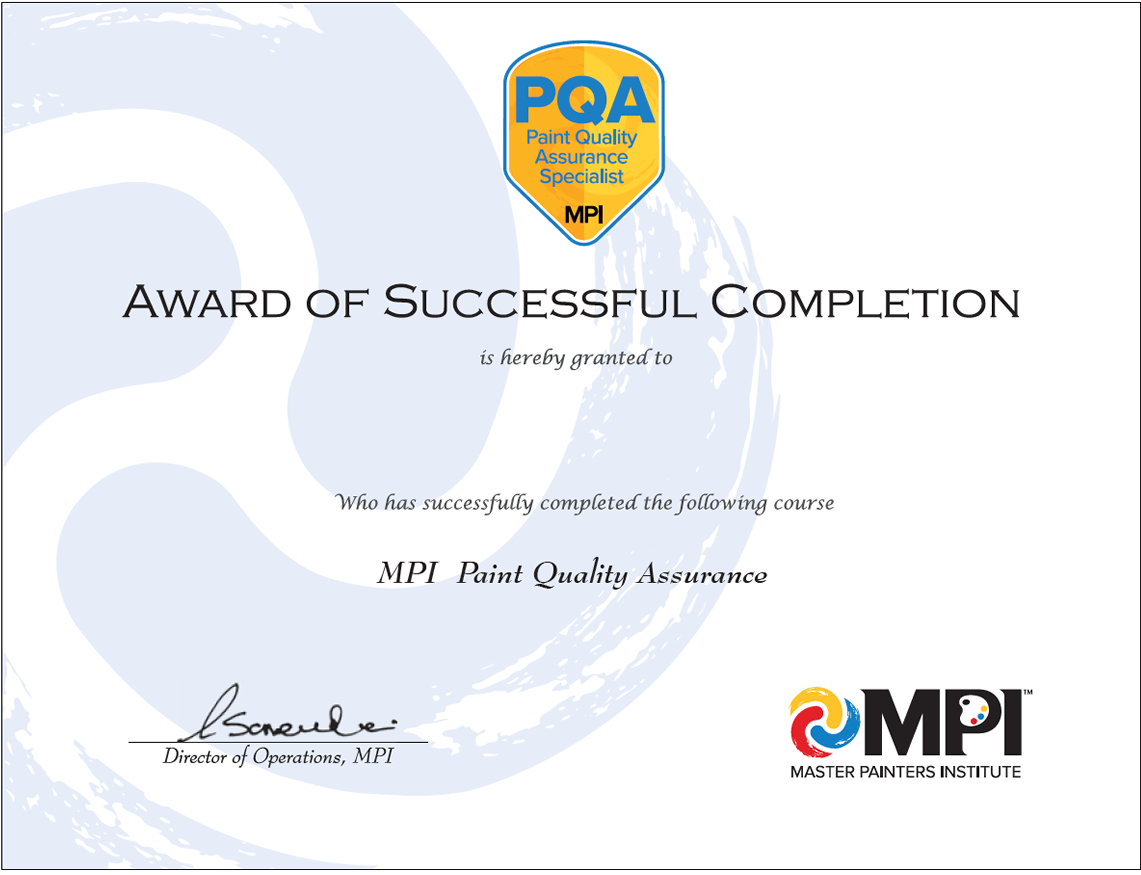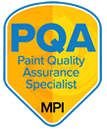INTRODUCTION
MPI’s Paint Quality Assurance training course is the highest level of commercial/institutional paint training offered and is the final and most comprehensive course in MPI’s training program. Graduates of this course will gain the knowledge required to add value to almost any aspect of an architectural/commercial paint project from specifications, surface preparation, application, paint quality assurance, as well as elements of inspection. Completion of this course is considered a requirement and specified on new build/Architectural and Repainting coatings projects.
Note: Completion of this final course does not give the designation of ‘MPI Inspector’ or ‘MPI Certified Architectural Coatings Inspector’. There are additional assessments required for that, please contact the office for more information.
Architects, Specifiers, Interior Designers & Inspectors
- Generate maximum value for clients and clearly communicate outcome expectations by having the knowledge to select the best performing systems for any given project while accounting for the constraints of varying: budgets, condition of existing substrates/coatings, environmental goals, and exposure environments
- Prevent costly mistakes by identifying defects and failures through the use of testing equipment for inspection
- Ensure that specifications are met by understanding the responsibilities of the various trades involved in the project and how to document job quality
Facility Owners/Managers & Property Managers
- Effectively plan maintenance schedule by determining the root cause of failures and defects and understanding the probable life cycle of the selected system given the exposure environment
- Avoid costly repaints and accurately manage budgets for any project by writing strong detailed specs
- Ensure specified quality is met while saving money by insourcing inspection duties.
General Contractors, Painting Contractors and Builders
- Win more bids with the highest level of architectural/commercial certification in paint quality assurance on your staff
- Reduce liability on jobs through a thorough understanding of each party’s responsibilities with respect to the project and by learning how to document work to prove adherence to the specification
- Gain a competitive advantage and generate new revenue streams through the highest level of 3rd party certification
Sales Representatives & Retail Store Staff
- Become a one-stop resource for all your customers’ architectural painting needs by being able to offer expert-level product recommendations, full-service inspection, detailed written specifications and dynamic problem solving.
- Reinforce the credibility of advice and product recommendations for commercial/institutional projects through verified 3rd party certification
MODULES
General Introduction
Professional conduct
Topics Covered:
- Why the correct behavior is important for an inspector.
- The importance of reliability and ethics.
- How to maintain the correct appearance as an inspector, including personal hygiene, Inspector uniform and personal protective equipment.
- What the responsibilities of an Inspector are, including:
- Inspector Tasks
- Information to be included in all reports.
- The basic areas that should always be checked during an inspection.
- Why it is important to maintain an independent role and how to provide impartial and objective judgements.
The Psychology of Working with People
Topics Covered:
- The types of communication, including the pros and cons of each when used in an inspector situation.
- How to be a good listener, tips on how to listen to and understand the conversation.
- The consideration of cultural issues when communicating and overcoming language barriers.
- How to deal with your own and others defensive behavior through proper communication and body language.
- What types of negotiator an inspector should be, practical negotiation skills and the process of negotiation.
- How to be a successful salesman while maintaining or building relationships with clients.
- Good habits to help achieve successful time management.
Specifications
Topics Covered:
- Understanding all the parts of a long Specification
- The bidding process and instructions to bidders.
- Familiarizing yourself with the property and gathering information for a pre-specification site observation.
- The DSD levels of a surface
- The use of Interior and exterior re-paint specifications.
- A conclusion for writing specifications.
Report Writing
Topics Covered:
- The skills required for successful documenting, including maintaining the quality of the report and being accurate.
- The basic types of forms used for each type of inspection carried out.
- Initial
- Interim
- Final
- Follow up
- Consultation
- Invitation to Tender
- A description of the form templates used by an inspector.
- What information should be gathered and entered into the forms for a complete and thorough inspection.
Blueprint Reading and Interpretation
Topics Covered:
- What a blueprint is, what it includes and who uses it.
- Full description and illustrations of the different parts of the blueprint
- A guide to the symbols and other graphics used in a blueprint.
- The scale of the drawing, including how to use both architectural and engineer rulers.
- The finish schedule, including the abbreviations used for substrate and materials.
- How and when to use a blueprint specification guide.
- The details contained within a blueprint specification
- Understanding how the blueprint and the specifications relate to one another.
Consultations (including mediation)
Topics Covered:
- Collecting and documenting information on failure analysis
- Determining and communicating the cause of the failure
- Detailed look at surface preparation as the cause of the failure.
- Investigating other types of failure including:
- Coating selection
- Application
- Paint formulation problems
- Environmental Issues
- Architectural designs
- When and how to be a mediator.
Site Inspections
Topics Covered:
- Descriptions and safe use of Personal protective equipment.
- Other areas that could potentially be hazardous or cause harm while carrying a site inspection.
- Safety signage symbols, descriptions and the meanings.
- Safe visitor access to site and the rules for staying safe while on site.
- Detailed descriptions of each of the types of visits that an inspector may be required to attend including:
- Initial
- Interim
- Final
- Follow up
Inspection Equipment (what substrate, when to use, how to use)
Topics Covered:
- The different types of Inspection Equipment
- When and how to use specific equipment
- What equipment should be used for which substrate
- Equipment Calibration and Maintenance
- Which items of equipment to carry on you at all times.
- How to use specific equipment (videos)
Students who successfully complete this course become 'Architectural Coating Specialist’ (ACS) and will receive the following award and badge:


